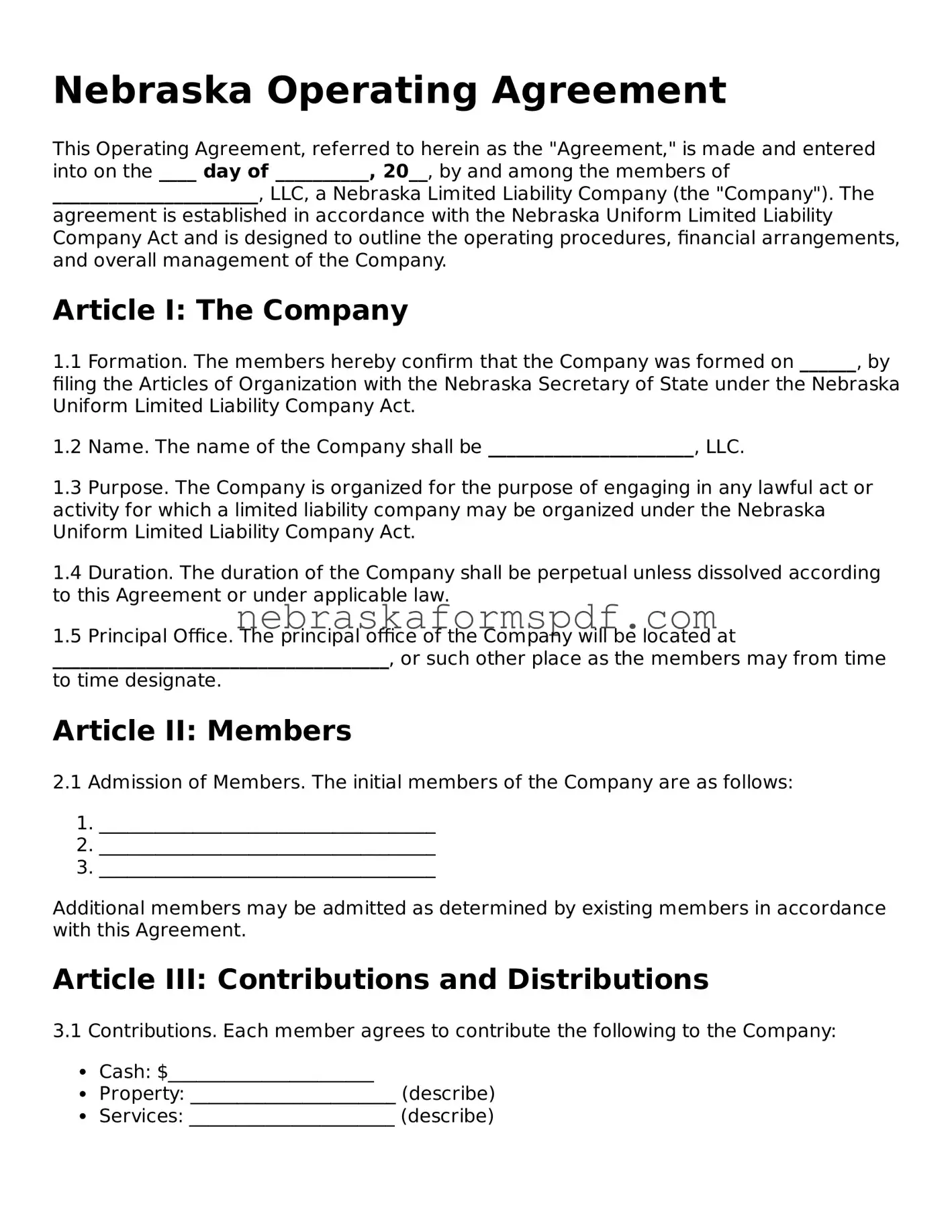Nebraska Operating Agreement
This Operating Agreement, referred to herein as the "Agreement," is made and entered into on the ____ day of __________, 20__, by and among the members of ______________________, LLC, a Nebraska Limited Liability Company (the "Company"). The agreement is established in accordance with the Nebraska Uniform Limited Liability Company Act and is designed to outline the operating procedures, financial arrangements, and overall management of the Company.
Article I: The Company
1.1 Formation. The members hereby confirm that the Company was formed on ______, by filing the Articles of Organization with the Nebraska Secretary of State under the Nebraska Uniform Limited Liability Company Act.
1.2 Name. The name of the Company shall be ______________________, LLC.
1.3 Purpose. The Company is organized for the purpose of engaging in any lawful act or activity for which a limited liability company may be organized under the Nebraska Uniform Limited Liability Company Act.
1.4 Duration. The duration of the Company shall be perpetual unless dissolved according to this Agreement or under applicable law.
1.5 Principal Office. The principal office of the Company will be located at ____________________________________, or such other place as the members may from time to time designate.
Article II: Members
2.1 Admission of Members. The initial members of the Company are as follows:
- ____________________________________
- ____________________________________
- ____________________________________
Additional members may be admitted as determined by existing members in accordance with this Agreement.
Article III: Contributions and Distributions
3.1 Contributions. Each member agrees to contribute the following to the Company:
- Cash: $______________________
- Property: ______________________ (describe)
- Services: ______________________ (describe)
3.2 Distributions. Distributions of the Company's profits and losses shall occur at the discretion of the members but no less than annually. Distributions will be made in accordance with the percentage of ownership of each member.
Article IV: Management
4.1 Managers. The Company shall be managed by one or more managers who may be selected from among the members. The initial manager(s) shall be:
- ____________________________________
- ____________________________________
4.2 Powers of Managers. The managers have the authority to carry out the day-to-day operations of the Company and make decisions regarding the business in accordance with this Agreement.
Article V: Dissolution
5.1 Events of Dissolution. The Company may be dissolved upon the occurrence of any of the following events:
- The unanimous vote of the members;
- The sale, exchange, or other disposition of substantially all of the assets of the Company;
- The passage of ____ years, unless the members agree in writing to continue the Company;
- Any event that makes it unlawful for the business of the Company to be carried on by the members.
5.2 Winding Up. Upon dissolution, the Company shall be wound up in accordance with the Nebraska Uniform Limited Liability Company Act, and after paying or making provision for all debts, liabilities, and obligations of the Company, the remaining assets shall be distributed among the members in accordance with their respective ownership interests.
Article VI: Miscellaneous
6.1 Amendments. This Agreement may be amended or modified only by a written agreement executed by all members.
6.2 Governing Law. This Agreement shall be governed by and construed in accordance with the laws of the State of Nebraska.
6.3 Entire Agreement. This Agreement contains the entire understanding among the members concerning the subject matter hereof and supersedes all prior agreements and understandings, oral or written, relating to such subject matter.
IN WITNESS WHEREOF, the members have executed this Operating Agreement as of the date first above written.
Members:
____________________________________
Signature
____________________________________
Name (Print)
____________________________________
Date
Repeat the above for each member

